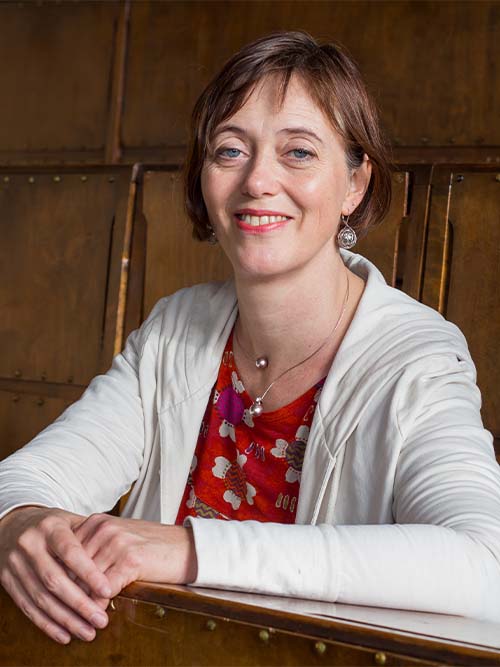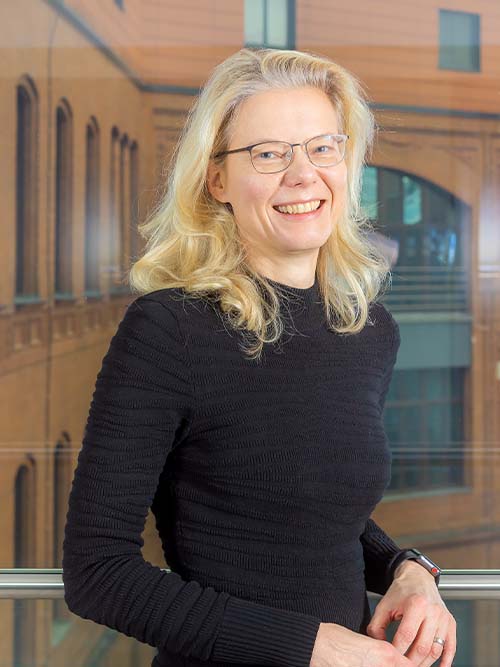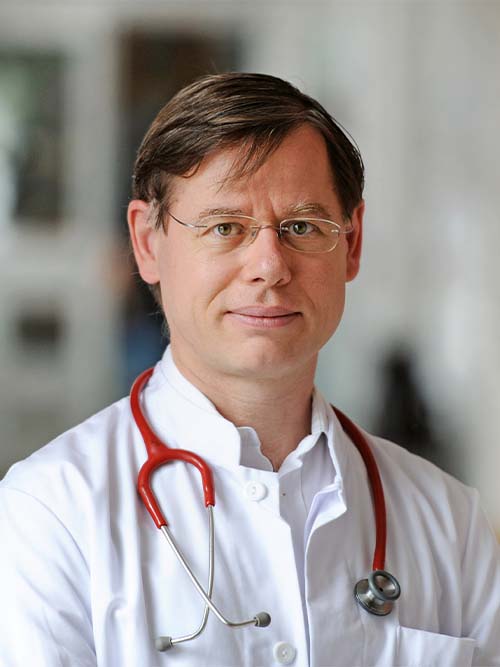

children and adolescents




research into clinical practice


in the DZKJ-Academy
DZKJ mission:
Promoting health of children and adolescents

About us
German Center for Child and Adolescent Health (DZKJ)
Childhood and adolescence are key development periods in life. Events during this time will have life-long health percussions. Our goal is to ensure that children and adolescents at every stage of growth have optimal access to early detection of diseases and are treated in accordance to the latest medical findings.
To achieve this goal, it is necessary:
- To recognize and to take into account age-specific developments and risks
- To understand disease mechanisms
- To early diagnose diseases
- To develop new therapies
- To effectively prevent health impairments.
The founding of the DZKJ sustainably supports multidisciplinary national and international health research for the benefit of sick children and adolescents.
Partner Sites
Partner Sites of the German Center for Child and Adolescent Health (DZKJ)
After more than ten years of planning and development in dialogue between the Federal Ministry of Education and Research (BMBF), the German Society for Pediatric and Adolescent Medicine (DGKJ) and other professional societies, the BMBF has issued the call for funding for the concept development phase for the establishment of the Center for Child and Adolescent Health (DZKJ) in July 2020.
In March 2021, the seven partner sites Berlin, Göttingen, Greifswald/Rostock, Hamburg, Leipzig/Dresden, München and Ulm were selected from a total of 23 site applications in a multi-stage competitive process by an international expert review panel. The partner sites include universities, university hospitals and non-university research institutions (Max Planck Institutes, Helmholtz Institutes, etc.) and form close regional, national, and international network. In recent months, the partner sites have jointly developed a DZKJ research program, which is currently undergoing an international review process.

GREIFSWALD / ROSTOCK
The Partner Site Greifswald/Rostock has
special expertise in community medicine,
psychosocial and mental health as well
as competences in telemedicine and eHealth.
HAMBURG
The focus of the DZKJ location in Hamburg
is on research into rare genetic diseases.
BERLIN
The Partner Site Berlin has special
expertise in rare genetic diseases,
chronic inflammatory diseases and early
determinants of health and disease.
GÖTTINGEN
The Partner Site Göttingen has special
expertise in neuroscience.
LEIPZIG / DRESDEN
The Leipzig/Dresden site provides
scientific and clinical expertise in
epidemiology, environmental research,
immunology, infectious diseases, obesity,
and mental health.
ULM
The Partner Site Ulm focuses on
metabolism, hormones and obesity,
normal and aberrant development
of the immune system, and the
immuno-metabolic basis of
mental disorders.
MÜNCHEN
The Partner Site Munich contributes its
expertise in immunology and metabolism,
computer sciences, and cell- and gene therapy.
Contacts
Contacts of the DZKJ Partner Sites
The Berlin site integrates basic, translational and clinical research in pediatrics and the life sciences. The focus is on rare genetic diseases, chronic inflammatory diseases, and early determinants of health and disease, as well as the use of systems medicine approaches for the discovery of disease mechanisms and novel therapeutic targets. Key infrastructures include innovative (single cell-) multi-omics technologies, disease-relevant model systems, large patient cohorts, artificial intelligence and digital health, as well as clinical trials in children and adolescents. Partners are the Charité – Universitätsmedizin Berlin, the Berlin Institute of Health (BIH), the Max Delbrück Center for Molecular Medizin (MDC) in in the Helmholtz Association and the Deutsche Rheuma-Forschungszentrum (DRFZ) in the Leibniz Association.

Prof. Dr.
Marcus A. Mall
Speaker Partner Site
- +49 30 450 566 182
- marcus.mall@charite.de

Dr. Nora Kofoed-Branzk
Dr. Nancy Freitag
Coordination Partner Site
- +49 30 450 616 144
- nora.branzk@charite.de
The Göttingen site combines basic and translational research in the neurosciences. The focus is on the development and function of the central nervous system (CNS) and its disturbances in neurological and non-neurological diseases. The special infrastructure includes human CNS biomaterials and disease models, innovative technological developments such as STED microscopy, real-time MRI and the therapeutic application of stem cells, as well as an integrative research data infrastructure. Partners are the University Medical Center Göttingen, the Georg-August-University Göttingen, the Max Planck Institute for Multidisciplinary Sciences, the German Primate Center and the Fraunhofer Institute for Translational Medicine and Pharmacology ITMP.

Prof. Dr.
Jutta Gärtner
Speaker Partner Site and DZKJ Chair
- +49 551 39 67015
- gaertnj@med.uni-goettingen.de
Department of Pediatrics and Adolescent Medicine
Robert-Koch-Straße 40
37075 Göttingen

Dr.
Simone Schröder
Coordinator Partner Site
- +49 551 39 68086
-
simone.schroeder@
med.uni-goettingen.de
University Medical Center Göttingen (UMG)
Department of Pediatrics and Adolescent Medicine
Robert-Koch-Straße 40
37075 Göttingen
The Partner Site Greifswald/Rostock is an interdisciplinary consortium with a unique joint main research focus in community medicine. The overall aim of research is to improve the health situation and quality of life of the population. Access to medical care, prevention and social participation should be ensured for all children and adolescents by applying innovative care models. The entire community medicine-continuum from epidemiological basic research to health services and prevention research can be realized at the site Greifswald/Rostock. The special infrastructure includes excellent connections to a broad network of medical and community partners, competencies in telemedicine and eHealth, and fully digitized instruments for consent- and ID-management for trusted third party functionalities. Partners are University Medicine Greifswald, the University Medicine Rostock, and the University Greifswald.

Prof. Dr.
Neeltje van den Berg
Speaker Partner Site
- +49 3834 867771
-
neeltje.vandenberg@
uni-greifswald.de
17487 Greifswald

d
Daniel Troitzsch
Coordinator Partner Site
- +49 3834 8622706
-
daniel.troitzsch@
uni-greifswald.de
17487 Greifswald
At the Hamburg site, the focus is on researching and treating rare genetic diseases. Research involves identifying genetic diseases, understanding the underlying molecular mechanisms, targeting new therapies, and approving and introducing new treatments. Another focus is research into congenital neurological diseases. In addition, the Hamburg location contributes to the research areas of immunology, especially in the field of transplantation medicine, and to psychosocial and mental health. The location has an excellent infrastructure. This includes, among other things, a platform for drug development and outstanding expertise in the field of systems medicine. Partners of the Hamburg DZKJ location are the University Hospital Hamburg-Eppendorf and the Leibniz Institute of Virology (LIV).

Prof. Dr.
Ania C. Muntau
Speaker Partner Site
- +49 40 7410 56133
- muntau@uke.de
University Medical Center Hamburg-Eppendorf (UKE)
Department of Pediatrics and Adolescent Medicine
(Kinder-UKE)
Martinistraße 52
20246 Hamburg

d
Judith Kösters
Coordinator Partner Site
- +49 40 7410 55651
- j.koesters@uke.de
University Medical Center Hamburg-Eppendorf (UKE)
Department of Pediatrics and Adolescent Medicine
(Kinder-UKE)
Martinistraße 52
20246 Hamburg
In an overarching and holistic approach, the Leipzig/Dresden site combines comprehensive epidemiological surveillance of child health and development in a dynamic environmental context with special consideration of the psyche-soma interaction. The site provides a broad interdisciplinary spectrum of scientific and clinical excellence in pediatric epidemiology, environmental research, immunology, infectious diseases, obesity, and mental health. The research is supported by a powerful complementary infrastructure, including a unique collection of cohorts, state-of-the-art technologies (high-throughput platforms, bio- and environmental monitoring, NGS technology), clinical research platforms, expertise on cell reprogramming/gene targeting/genetic engineering as well as GMP-conform facilities. Participating institutions at the site are the Leipzig University, the Technical University Dresden, the Helmholtz Centre for Environmental Research – UFZ as well as the Helmholtz Institute for Metabolic, Obesity and Vascular Research (HI-MAG), the Max Planck Institute for Evolutionary Anthropology, and the Robert Koch Institute.

Prof. Dr.
Antje Körner
Speaker Partner Site
- +49 341 97 26500
-
antje.koerner@
medizin.uni-leipzig.de
04103 Leipzig

Dr.
Katja Piotrowski
Coordinator Partner Site
- +49 341 97 26100
-
katja.piotrowski@
medizin.uni-leipzig.de
Liebigstraße 19
04103 Leipzig
The Munich site contributes its specific research expertise in the fields of immunology and metabolism. The focus is on the identification of genetically determined disease factors, the development of new methods of precision diagnostics (including AI-based analytics) as well as novel strategies in cell and gene therapy. Scientists from Munich share their infrastructure to unravel disease mechanisms using in vitro and in vivo models (e.g. transgenic large animals) and platforms to design cell- and gene therapy. The translational research program is inspired and guided by the principles of the UN Convention on the Rights of the Child. The Munich site is orchestrated by the LMU with partners at LMU Klinikum, Klinikum of the Technical University Munich, the Helmholtz Zentrum Munich, and the Max Planck Institute of Biochemistry.

Prof. Dr. Dr.
Christoph Klein
Speaker Partner Site
- +49 89 4400 57701
-
christoph.klein@
med.uni-muenchen.de
80337 München

Dr.
Carolin Ruther
Coordinator Partner Site
- +49 89 4400 57972
-
carolin.ruther@
med.uni-muenchen.de
80337 München
The Ulm site focuses on metabolism, hormones and obesity, normal and aberrant development of the immune system, and the immuno-metabolic basis of mental disorders. It contributes expertise ranging from molecular medicine to psychologic, digital and ethical aspects of these foci. Ulm investigates somatic (epi)genetic mechanisms in development and disease, early programming of morbidity and mortality later in life, and coping with the sequelae of life-threatening and chronic diseases. The site conducts prevention programs and develops digital health approaches for health care and health control. These approaches profit from well-established interdisciplinary, trans-sectoral interactions including cooperation with pharmaceutical industry, from strong methodological platforms and from unique, large patient and population-based cohorts. Partners are Ulm University, its Medical Faculty, its University Hospital and the Red Cross Blood Transfusion Center.

Prof. Dr.
Klaus-Michael Debatin
Speaker Partner Site and DZKJ Vice Chair
- +49 731 500 57001
-
klaus-michael.debatin@
uniklinik-ulm.de
Eythstraße 24
89075 Ulm

d
Nicolas Marschall
Coordinator Partner Site
d
- +49 731 500 57124
-
nicolas.marschall@
uniklinik-ulm.de
Eythstraße 24
89075 Ulm
Research focus
Main research areas oft the German Center for Child and Adolescent Health
In a translational research approach, the DZKJ connects basic research, clinical research and clinical application up to personalized therapy and prevention. The core element of the joint strategy is the bundling of existing clinical competencies and scientific expertise with a simultaneous close networking of research infrastructures.
The DZKJ research program will address projects on healthy development, genetic and pathophysiological aspects of rare and common diseases, predisposition and vulnerable phases of disease development, new diagnostic methods, new therapeutic approaches, and prevention measures. For this purpose, seven central DZKJ research foci have been selected, each coordinated by two sites.
The diagnosis and treatment of rare diseases, including undiagnosed diseases mostly of genetic origin, is an essential part of pediatric medicine and poses a particular challenge for society. We will develop a translational pipeline from up-front molecular diagnosis to unraveling of disease mechanisms and targeted treatment programs for specific rare disease entities.
Understanding the development of a healthy immune system, its response to challenge, e.g., by infection and its aberration in genetically defined immunodeficiencies is expected to highlight genes and pathways that are critical for common diseases such as autoinflammation and allergy. This will not only open new paths for endotyping complex diseases and stratifying therapies but also allow for the discovery of new therapeutic targets and the design of precision medicine.
Basic science on understanding molecular, structural, and functional networks of the CNS will identify key factors for physiological development and manifestation of neurological diseases. Since the CNS has innumerable interactions with all organ systems of the human body, studies will include the influence of the CNS on non-neurological diseases and vice versa. The focus is on novel CNS-specific and cross-organ diagnostic and treatment to halt, repair or prevent CNS damage at an early stage to avert lifelong residual CNS damage and disabilities.
Early onset of metabolic disturbances and obesity causes a high burden of disease in the long run. Research into the etiology and molecular mechanisms are expected to provide novel targets for therapeutic intervention and measures for targeted prevention programs. This includes understanding obesity as a multisystem disease with mutual interactions with other organ systems, particularly the immune system, neuroregulatory networks, adipose tissue, and metabolism. Novel evidence-based treatment approaches and their standardization in pediatric care will be developed and promoted.
The multiple internal and external influences on the development of children provide the basis for health, as well as disease susceptibility and altered development. In this research area, we will address these ‘exposome’ influences as health risks emerging from the interplay between predisposition and our changing environment, identify risk and resilience factors and unravel mechanisms underlying the development of common disease with origin in childhood.
The joint research platform with the German Center for Mental Health (DZPG) addresses key issues of mental health in somatically ill patients and somatic issues in mentally ill patients. The DZKJ focus is on psychosocial aspects and mental health in somatic diseases. This program greatly interacts with several core research areas of both DZKJ and DZPG including, e.g., CNS development, Immunometabolism and Community medicine.
Community medicine covers a research continuum, starting with epidemiological questions (investigation of morbidity, risk and protective factors), epidemiological analyzes of care (e.g. care needs, utilization and access to care), development of innovative care and prevention concepts as well as the implementation of the concepts in real healthcare settings and the transfer into clinical practice and the regular healthcare system. The Community medicine research program also considers questions of social justice and participation and includes patient-relevant endpoints as well as psychosocial and socioeconomic parameters.
About our academy
DZKJ Academy
A central concern of the DZKJ is the promotion of excellent junior staff in the field of child and adolescent health. To this end, the DZKJ Academy bundles a wide variety of programs for scientists and physicians and promotes exchange between institutions for career development and to support research programs.
